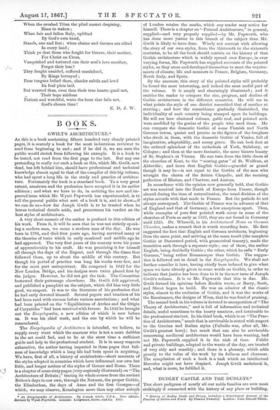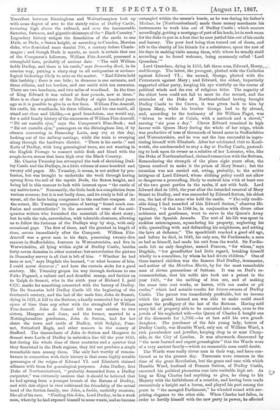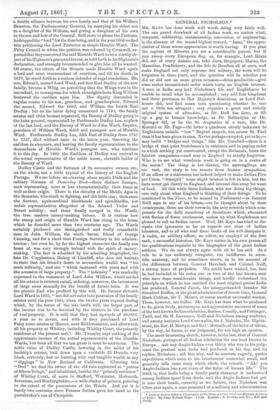DUDLEY CASTLE AND THE DUDLEYS.* THE short pedigrees of nearly
all our noble families are seen most strikingly if connected with the history of any place or building.
• History of Dudley Castle and Priory, including a Genealogical Account of tho Families of Sutton and Ward. By Charles Twamley. Landon: John Russell Smith.
Travellers between Birmingham and Wolverhampton look up with some degree of awe to the stately ruins of Dudley Castle, towering high above the railroad, and over the innumerable factories, furnaces, and gigantic chimneys of the" Black Country." Legendary history assigus the foundation of the castle to one Duds, or Dodo, a Saxon knight, or according to Camden, Mercian -duke, who flourished anno domini 700, a century before Charle- magne; and though Duds is mystic, so much is certain that one of the Conqueror's followers, William Fitz-Ausculf, possessed a stronghold here, probably of ancient date. "The said William holds Dudley, and there is his castle," says Domesday Book, in its -concise way, putting a sharp stop to all antiquarian or archaeo- logical bickerings likely to arise on the matter. "Earl Edwin held this lordship ; there is one hide ; in demesne is one carucate, and three villains, and ten borders, and one smith with ten carucates. 'There are two bondmen, and two miles of woodland. In the time of King Edward it was valued at four pounds, now at three." Here is as clear a picture of the Dudley of eight hundred years .ago as it is possible to give in so few lines. William Fitz-Ausculf, his castle, his woodlands, his three villains, and his one smith, all stand out clear and lifelike,—a good foundation, one would say, for a solid family history of the successors of William Fitz-Ausculf.
Ibi eat castellii ejus," says the Conqueror's Blue-Book ; and -"Ibi eat castelln ejus," passengers on the Birmingham line, if by chance conversing in Domesday Latin, may cry at this day, looking out of the railway carriage, while the train is sweeping -along through the hardware district. "There is his castle :" and Earls of Dudley, with long genealogical trees, are not wanting in the English Peerage to connect noble flesh and blood with the rough-hewn stones that loom high over the Black Country.
Mr. Charles Twarrdey has attempted the task of sketching Dud- ley Castle and the Dudleys, in a little volume of some hundred and twenty odd pages. Mr. Twamley, it seems, is not author by pro- fession, but was brought to undertake the work through having sprung from the soil of the mystic Duds, the Saxon knight, and being led in this manner to look with interest upon "the castle of any native town." Necessarily, the little book is a compilation from various sources; but it is not badly done, and its study is full of in- terest, all the facts being compressed in the smallest compass. At the outset, Mr. Twamley complains of having "found much con- fusion and contradiction" in the accounts of some of the anti- -quarian writers who furnished the materials of his short story; but he tells the tale, nevertheless, with tolerable clearness, allowing os to follow the fortunes of the Dudleys step by step, with only -occasional gaps. The first of these, and the greatest in length of time, occurs immediately after the Conquest. William Fitz- Ausculf was a great man in his days, possessing twenty-five entangled within the usurer's bonds, as he was during his father's lifetime, he [Northumberland] made these money merchants his instruments to work him out of Dudley Castle ; which usurers accordingly, getting a mortgage of part of his lands, let in such room for the duke to put in a foot that he soon jostled him out of his castle and barony. The poor lord being thus turned out of doors, and left to the charity of his friends for a subsistence, spent the rest of his days in making visits among them, with whom he usually staid according as he found welcome, being commonly called 'Lord Quondam." Lord Quondam, dying in 1553, left three sons, Edward, Henry„,:, and George. The latter, the youngest, plotted with the Catholics against Edward VI.; the second, George, plotted with the Protestants against Mary ; and Edward, the eldest, impartially supported either party, keeping his eye wistfully on the course of political winds and the run of religious tides. The sagacity of the eldest born could not fail to meet its due reward, and the attainder of the Duke of Northumberland having brought Dudley Castle to the Crown, it was given back to him by Queen Mary, while his brother George had to fly abroad, and, according to the testimony of Sir William Paget, was "driven to worke at Calais, with a mattock and a shovel," earning "six pens a day." Clever Edward remained in high favour with Queen Mary during the whole of her reign, which was productive of tens of thousands of broad acres in Staffordshire and Worcestershire, and he was not the lass successful in ingra- tiating himself with Elizabeth. After her celebrated visit to Kenil- worth, she condescended to stay a day at Dudley Castle, pretend- ing to look upon its owner as a relative of her Leicester, who, like the Duke of Northumberland, claimed connection with the Suttons. Remembering the strength of the place eight years after, the Queen resolved to make it the prison of Mary Stuart ; but the intention was not carried out, owing, probably, to the active intrigues of Lord Edward, whose shifting policy could not allow so dangerous a proceeding, likely to embroil him with at least one of the two great parties in the realm, if not with both. Lord Edward died in 1585, the year after the intended removal of Mary Stuart to Dudley, and was succeeded by Edward Sutton, his eldest son, the last of the name who held the castle. "The only credit- able thing I find recorded of this Edward Sutton," observes Mr. Twamley, "is that in 1588 he, in conjunction with divers other noblemen and gentlemen, went to serve in the Queen's Army against the Spanish Armada. The rest of his life was spent in reckless extravagance, squandering his property, neglecting his wife, quarrelling with and defrauding his neighbours, and setting the laws at defiance." The spendthrift reached a good old age, and before he died, in 1643, his only son, Sir Ferdinando, a man as bad as himself, had made his exit from the world. Sir Ferdin- ando left an only daughter, named Frances, "for whom," says Dugdale, "her grandfather had little regard, betaking himself wholly to a concubine, by whom he had divers children." One of these bastard children was the famous Dud Dudley, ironmaster, and author of the Metallunz Martis, by far the most remarkable man of eleven generations of Suttons. It was on Dud's re- commendation, that his noble sire took out a patent in the year 1621, "for the melting of iron ore, and of making the same into cast works, or barres, with sea coales or pit coales," which had notable results for future owners of Dudley Castle. The patent was immediately profitable, but no income which the genial bastard son was able to make could stand against the profligacy of the last of the Buttons. Having sold every bit of property able to be converted into cash, even to the jewels of his neglected wife—the Queen of Charles I. bought one of the diamonds for 1,7001.—he at last sold his own grand- daughter. The purchaser of the fair young lady, heiress of Dudley Castle, was Humble Ward, only son of William Ward, a rich pawnbroker and jeweller, keeping shop in or near Cheap- side, in the City of London. It was afterwards discovered by "the most learned and expert genealogists" that the Wards were of a very ancient family—which no reasonable man could doubt. The Wards were really clever men in their way, and have con- tinued so to the present day. Turncoats were common in the time of the great Revolution, but the grace and ease with which Humble Ward, husband of Frances Sutton, of Dudley Castle, executed his political pirouettes rose into veritable high art. As long as King Charles had anything to give, he clung to his Majesty with the faithfulness of a courtier, and having been made successively a knight and a baron, and played his part among the peers in "the mongrel Parliament," he wheeled round with sur- prising elegance to the other side. When Charles had fallen, in order to fortify himself with the new party in power, he effected a double alliance between his own family and that of Sir William Brewton, the Parliamentary General, by marrying his eldest son to a daughter of Sir William, and giving a daughter of his own to the son and heir of the General. Still more to please the Puritans, 'he dropped the "lord" for the time being, and in the year 1656 we find him petitioning the Lord Protector as simple Humble Ward. The Privy Council to whom the petition was referred by Cromwell, re- portedthat theyconceived the said Humble Ward to be a worthy ob- ject of his Highness's grace and favour, as held forth in his Highness's declaration, and strongly recommended to give him all he wanted. Of course, the return of the Stuarts made Humble Ward again a lord and most transcendent of courtiers, and till his death, in 1670, he stood forth as a zealous defender of regal absolutism. His son, Edward, second Lord Ward, and first Earl Dudley of the new family, became a Whig, on perceiving that the Whigs were in the ascendant, in recompense for which clearsightedness King William bestowed the earldom upon him. The dignity descended in regular course to his son, grandson, and grandnephew, Edward the second, Edward the third, and William the fourth Earl Dudley ; but on the latter dying unmarried in 1740, the family 'estates and titles became separated, the Barony of Dudley going to the heirs general, represented by Ferdinand° Dudley Lea, nephew .of the last lord, and the Barony of Ward to John Ward, Esquire, grandson of William Ward, third and youngest son of Humble Ward. Ferdinando Dudley Lea, fifth Earl of Dudley from 1740 to 1757, died without issue in the latter year, throwing the earldom in abeyance, and leaving the family representation to the descendants of Humble Ward's youngest son, who continue it to this day. In 1860 the Earldom of Dudley was revived in the actual representative of the noble house, eleventh holder of the Barony of Ward. Dudley Castle and the fortunes of its successive owners are, on the whole, not a little typical of the history of the English .Peerage. We see before us—leaving alone mystic Duds and the solitary Norman of Domesday Book—three distinct lineages, each representing, more or leas characteristically, their times as well as their origin. There is the chivalry of the Middle Ages in the Someries, who stuck to fighting, and did little else ; then came the Suttons, squirearchical blockheads and spendthrifts, not unfair representatives altogether of the debased Tudor and Stuart nobility ; and these finally merged in the Wards, the true modern money-making barons. It is curious how the stamp and origin of Humble Ward has clung to the house which he founded more than two centuries ago. The Wards certainly produced one distinguished and really remarkable man in John William, the ninth baron, friend of George 'Canning, and for a short time Foreign Secretary in his adminis- tration; but even he, by far the highest character the family can boast of, was very strongly imbued with the spirit of money- making. The fact is admitted by his admiring biographer, the iate Dr. Copplestone, Bishop of Llandaff, who does not hesitate to state that his friend's desire to accumulate wealth was "his main infirmity," and one "which increased with years and with the accession of large property." The " infirmity " was markedly expressed in the testament of Lord John William, which settled all his estates in strictest entail, ordering, moreover, the investment of large sums annually for the benefit of future heirs. it was the present Earl who profited by this will. He became eleventh Lord Ward in 1835, "but did not enter into possession of the family estates until the year 1845, when the twelve years expired during which, by the terms of the late lord's will, the larger part of the income was to be invested by the trustees in the purchase of real property. It is said that they had upwards of 80,000/. a year BO to invest, and with it they purchased of Lord Foley some estates at Hurcot, near Kidderminster, and afterwards all his property at Whitley, including Whitley Court, the princely residence of the present earl." Mr. Twamley says nothing of the approximate income of the actual representative of the Humble Wards, but from all that we can guess it must be enormous. The noble ruins of Dudley Castle, towering in the midst of his lordship's estates, look down upon a veritable El Dorado, very black, certainly, but as bursting with real tangible wealth as any 4' diggings" in New Zealand or California. Glancing into hi Dod " we find the owner of the old ruin registered as "patron of fifteen livings," and inhabitant, besides the "princely residence" of Whitley Court, of seats in Stafford, Worcester, Merioneth, Inverness, and Roxburghshire,—a wide cluster of palaces, pointing to the extent of the possessions of the Wards. And yet it is barely two, centuries since Frances Sutton gave her hand to the pawnbroker's son of Cheapside.
































 Previous page
Previous page